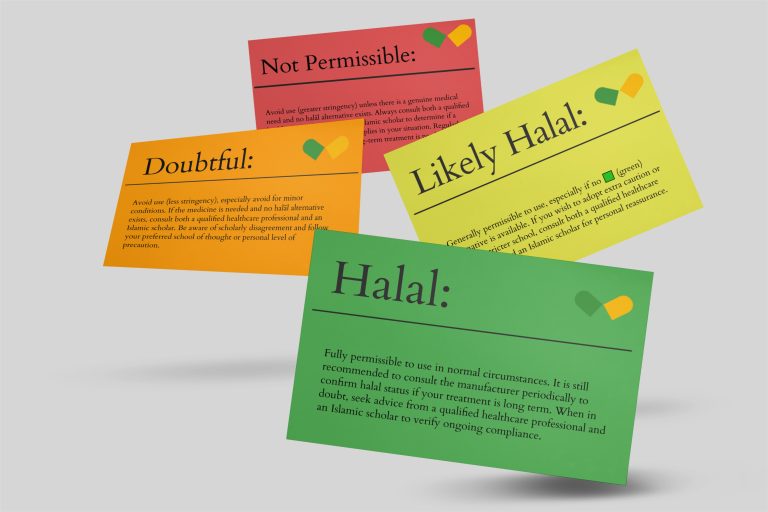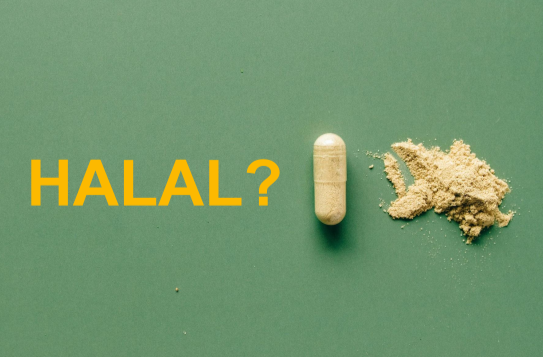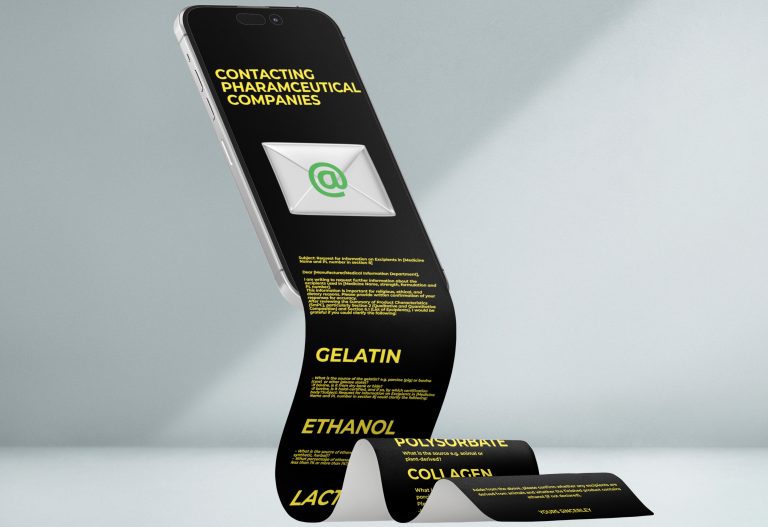This resource supports the Muslim community and their healthcare professionals (HCPs) in making person-centred, informed and shared decisions about medicines that may contain ingredients and/or excipients from haram sources.
It explains:
– Steps you may wish to take if a medicine contains ingredients and/or excipients from haram sources, following the use of HalalMed’s classification system and supporting resource
– When it may still be acceptable to use medicines containing ingredients and/or excipients from haram sources
– Why a halal alternative may not always be available
– The Islamic principles of hardship begets facility, necessity and the five conditions.
⚠️ Always speak to your healthcare provider before making any decisions or changes. Do not stop or delay medicines without seeking medical advice first.
Click each drop down below to find out more:
1️⃣Step 1: Check if the following guidelines apply to your individual case
It is important to remember that even if a medicine contains ingredients and/or excipients from haram sources, it does not always mean it is prohibited to take or use.
Here are some guidelines for taking or using medicines containing ingredients and/or excipients from haram sources (tadawi bil Muharram)1, which may apply to your individual situation.
Medical necessity (darurah)
⚠️ If there is an immediate need to treat a life-threatening condition → necessity permits the prohibited.
If there is an immediate or serious need to treat a life-threatening or significantly harmful condition, the principle of darurah (necessity) applies – al-darurat tubih al-mahzurat (necessities permit the prohibited). For example, in emergencies, when there is a strong likelihood of health deterioration, or when no suitable halal alternative is available – it becomes permissible to use a medicine containing otherwise prohibited ingredients and/or excipients.
This permissibility continues only until a suitable halal alternative becomes accessible.
The five conditions
⚠️If the condition is not life-threatening, the majority of scholars agree that a medicine containing ingredients and/or excipients from haram sources may become conditionally permissible – but only if ALL five conditions are fully met.
Under this principle, the use of an otherwise impermissible medicine is allowed solely when every one of the five criteria is satisfied.
👉You can find out more about the five conditions here.
Hardship begets facility (al-mashaqqa tajlib at-taysir)
⚠️ If you have made every reasonable effort to find a suitable halal alternative and it becomes excessively difficult or impractical to do so, leniency (rukhsah) may be applied – allowing you to use the medicine prescribed or supplied to you.
This principle means that when implementing a religious ruling causes undue hardship or becomes overly burdensome, the Shariʿah provides ease and flexibility to remove such difficulty.
👉 You can find out more about hardship begets facility here.
If you are unsure about taking or using medicines containing ingredients and/or excipients from haram sources, seek guidance from a practising Muslim HCP such as a pharmacist or doctor. Alternatively, consult your local Imam or a trusted Islamic scholar – ideally one who has knowledge and expertise in the fiqh (Islamic rulings) of medicine.
2️⃣Step 2: Try to seek a halal alternative (if required)
If none of the guidelines in Step 1 apply to your individual situation, you should try to find a suitable halal alternative – where available and clinically appropriate.
You can ask your pharmacist about possible options, such as:
- 💊 Different formulations (e.g. capsules instead of tablets, liquids, or injectables)
- 🌿 Alternative treatments (if they are clinically effective and suitable for your condition).
📝 Tip: Record the name, form, strength, and pharmaceutical company of any available halal alternatives – this will help you when reviewing your options in Step 3. Before approaching your HCP, you may wish to check with your local pharmacy to see if a halal alternative is available or if there are stock shortages.
⚠️ Important: Finding a halal alternative does not automatically mean it can be prescribed or supplied. There may be restrictions or clinical limitations – see the section on ‘Limitations on prescribing‘.
❌ If you are unable to find a halal alternative, or if none of the guidelines in Step 1 apply to your individual case, see the section on ‘Hardship begets facility‘.
3️⃣Step 3: Speak to your healthcare professional (HCP)
Arrange an appointment with the HCP who prescribed or supplied your medicine – e.g. a doctor, pharmacist, dentist, nurse, midwife, optometrist, physiotherapist, podiatrist, radiographer, paramedic, or dietitian.
📝 Tip: Before your appointment, it may help to note down any questions or concerns you wish to discuss. You may want to talk about:
- 💬 Your ideas, concerns, expectations, feelings, or personal beliefs related to treatment
- 🩺 Your current condition and available treatment options
- 📋 Whether all five conditions for conditional permissibility have been met – e.g. confirming that your medicine was prescribed according to clinical guidelines and has evidence of effectiveness
- 🕋 Whether a halal alternative exists and if it can be prescribed or supplied.
- ⚠️ Why a halal alternative may not always be possible to prescribe, and what prescribing limitations may apply – see the section on Limitations on prescribing
- ❌ If no halal alternative can be prescribed or supplied → see the section on ‘Hardship begets facility‘.
HCPs may find our resource on ‘Supporting Muslim patients in consultations – a guide for healthcare professionals‘ helpful in facilitating these discussions with understanding and sensitivity.
Limitations on prescribing
Sometimes your healthcare professional (HCP) may not be able to prescribe or supply a halal alternative. This may be due to several factors, including:
The medicine is not cost effective
Cost-effective prescribing means a medicine should be safe, meet patients’ clinical needs, and provide the best value for money from NHS resources (GOV.UK)
A halal alternative may not meet these cost-effective criteria.
The medicine is not readily available locally
Before approaching your HCP, you may wish to check with your local pharmacy to see if a halal alternative is available or if there are stock shortages.
A halal alternative may not be easily sourced or distributed within your local area.
The medicine is not on the formulary
Formularies are approved lists of medicines that HCPs are expected to prescribe from, within their local NHS setting. These lists are based on evidence of clinical effectiveness, cost-effectiveness, and patient safety.
A halal alternative may not appear in the formulary, which may limit its use.
The medicine is not clinically effective
Your HCP may choose a specific medicine – e.g. a particular antibiotic – because it is the most clinically effective treatment for your condition.
A halal alternative may not offer the same level of proven clinical effectiveness or suitability.
❌ If a halal alternative cannot be prescribed/supplied → see the section on ‘Hardship begets facility‘.
Hardship begets facility
The principle of ‘Hardship begets facility”‘means that when practising a religious ruling becomes overly burdensome or creates genuine hardship, Islam allows leniency (rukhsah) to make matters easier. Allah Almighty says in the Qur’an:
“Allah intends ease for you, not hardship” (Surat al-Baqarah 2:185).
If you have made every reasonable effort to find a suitable halal medicine and it becomes too difficult or impractical to do so, this principle permits the use of an otherwise prohibited medicine.
This also applies to HCPs when prescribing or supplying such medicines out of necessity.
If you are unsure about taking or using medicines containing ingredients and/or excipients from haram sources, seek guidance from a practising Muslim HCP such as a pharmacist or doctor. Alternatively consult your local Imam or a trusted Islamic scholar – ideally one who has knowledge and expertise in the fiqh (Islamic rulings) of medicine.
⚠️ Important messages for patients
- Always take or use your medicine(s) exactly as directed or prescribed by your healthcare professional (HCP), such as your doctor or pharmacist
- Do not stop, delay, change or alter the way you take or use your medicine(s) without first discussing it with the HCP who prescribed or supplied it to you
- Always consult your HCP if you have any questions or before making any decisions about your treatment
- For Islamic guidance, seek advice from your local Imam or a trusted Islamic scholar – ideally someone with relevant knowledge and expertise in the fiqh (Islamic rulings) of medicines
- Use the information gathered to make an informed decision together with your HCP and, if needed, your local Imam or trusted Islamic scholar.
Disclaimer
- This resource is for educational purposes only. It does not constitute clinical, medical, or professional healthcare advice and should not replace individual clinical judgement or qualified religious guidance
- Always consult your doctor, pharmacist, or other healthcare professional regarding your own medical conditions or for advice on treatment options
- Healthcare professionals remain fully responsible and accountable for decisions made within their own scope of practice.
Further resources and references
- 1 Al Balagh Academy Ethical guidelines for prescribing and dispensing Haram medication by Shaykh Dr Rafaqat Rashid ↩︎
- Ingredients and excipients in medicines – detailed resources on ingredients and excipients commonly used in medicines which may raise concerns for the Muslim community
- Checklist of ingredients and excipients – a quick checklist of ingredients and excipients commonly used in medicines which may raise concerns for the Muslim community
- How to check if a medicine contains ingredients and excipients from haram sources – explains how to check medicines for ingredients and excipients that may be an issue in Islam, and what to do next
- Email template – to request clarification from pharmaceutical companies
- Reason codes: putting the classifications into practice – our classification codes for ingredients and excipients
- How we classify medicines based on ingredients and excipients – supporting guide for reason codes
- Supporting Muslim patients in consultations – a guide for healthcare professionals
- External resources – for healthcare professionals







